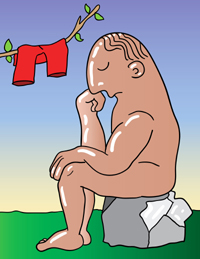Web 2.0 'knowledge': future of modern humanity? (I hope not)


What Web 2.0 induced “knowledge” shall we embrace, however?
Shall we honor the lowest common denominator component of user-generated content Gardner includes--bad music…goofy photos…personal diatribes…porn…spam—in his celebration of “so much knowledge”? If we did, it would be an affront to “objective scientific” knowledge.
How about Wikipedia, “the free encyclopedia that anyone can edit”? Shall we accept its user-generated content as knowledge creation? How can we, when Wikipedia’s own “About Wikipedia” page warns: “Because of recent vandalism, editing of this project page by anonymous or newly registered users is disabled.”
Gardner rejoices that “the barriers to finding at least some information on just about anything are so low” and concludes that “something is definitely different”:
What we are up to here is actually Knowledge 2.0, and it is at least a millennial trend, and it shows every indication of having anthropologic impact. That is, Knowledge 2.0 is changing the definition of what it is to be a modern human, individually and collectively.
Something is different, but it is not always an improvement to be “different.”
Not only does Gardner relish that now “anyone at all is a publisher, editor, evaluator, deleter, pundit, cynic, sharer, prophet, detractor, tattle-tale, ignorer, lier, pathetic, apathetic,” he puts forth that “not managing” the cacophony of Web-based user contributions being freely voiced, “has benefits”:
with K20, not managing, but letting the organic hierachies play out, are an important benefit. Because it's Web/blogosphere, not intranet, it's messy and not well defined, though Digg and others offer some structure. But it is at such high scale that qualitative benefits emerge. Structure would seem a limiter to me. People are unstructured, and so is most knowledge.
Call me old school, but I subscribe to the notion that while individuals may be free wheeling, knowledge, by definition, must not only be structured, it must reflect verifiable truths. In “Ideas of the Great Philosophers,” William Sahakian and Mabel Sahakian ponder the scope and limits of knowledge in “Epistemology and Logic”:
How much can a human being know?
Is knowledge possible?
What are the practical and theoretical limits of knowledge?The principal task of logic is to investigate the nature of correct thinking and valid reasoning, including the laws of rational thought.
The laws of logic cannot themselves disclose facts about the world of man or nature. In order to discuss such facts, or to evaluate the content of an argument, the individual must decide upon the criteria which can enable him to distinguish what is true from what is not true.
If scrutinized, logical truths are displaced by Web 2.0 induced, unmanaged “knowledge,” what does modern humanity portend?